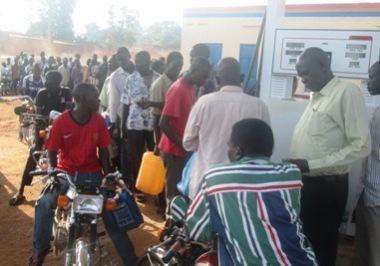Wau State hits by fuel shortage
January 13, 2017 (WAU) – A severe fuel crisis has hit Wau State in Western Bahr el Ghazal province since the beginning of the New Year 2017 as many fuel stations have been forced to close down.

Also, the fuel shortage has forced hotels to reduce their operation power supply from 24 hours to less than eight hours per day.
The litter of petrol which was at 70 SSP has increased to 200 SSP in the black market. A bottle of 1.5 litter amounted to 300 SSP, while last December you had only to pay 100 SSP in the parallel market.
Many people in Wau accuse fuel dealers of creating an artificial fuel scarcity in order to increase the prices.
Martin Khamis who is a black-market trader in Wau town since 2005 says the petrol is sold to some traders who store it instead of delivering it to fuel stations.
“We are getting this fuel we are selling now through difficulties. We are getting it from some traders who do buy it from exporters in barrels before to sell it to us,” said Khamis.
To explain the situation, another Somali trader ,Mohamed al-Sadiq, spoke about highway robbery by armed gangs when they bring petrol from Juba to Wau.
“We are experiencing a lots of insecurity along the way from Juba to Wau particularly between Yirol to Rumbek where there are a lot of robbers who attack trucks along the road,” he said.
“This is why when we manage to reach Wau, we make the price of fuel a bit high to recover our loses during the risky travel road,” al-Sadiq, added as he was speaking to Sudan Tribune upon his arrival from Rumbek on Friday.
This is not the first time that Wau experiences such fuel shortage, last year in 2016, similar scarcity hit all the Bahr el-Ghazal region.
People generally blame the government for this chronic fuel shortage, pointing to Juba failure to build oil refineries to cover local needs from the oil produced in Unity and Upper Nile regions, since the secession from Sudan in July 2011.
The import of fuel from Kenya and Uganda increases the prices of basic commodities and leads to a rise in the inflation and deterioration of the whole national economy, analysts say.
(ST)
